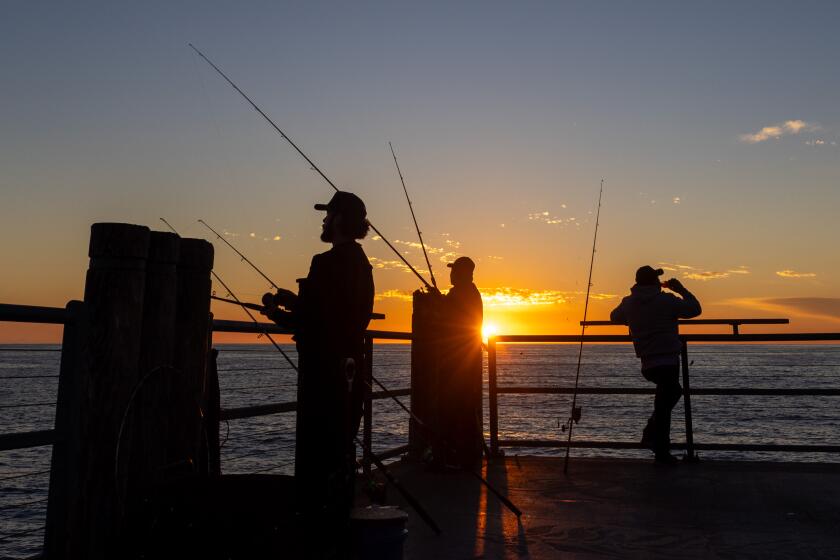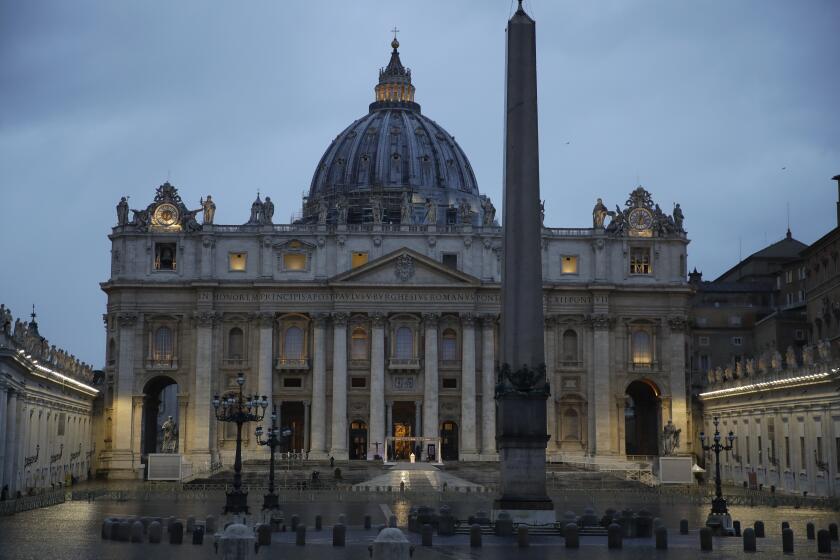In Bradley’s Wake, a Heated Rivalry Boils : Politics: Rep. Maxine Waters is now the premier African-American politician in Los Angeles. But a feud with Councilman Mark Ridley-Thomas threatens to disrupt addressing urgent urban issues.
The imagery borrows shamelessly from old Westerns. The once-respected marshal retires and rides quietly off into a lucrative sunset, his ears stinging with withering criticism from the new top gun.
But uneasy rests the holster on the new gunslinger’s hip. An ambitious younger rival has emerged. It is already dusk. And one of them may have to be out of town before sundown.
In this cast of characters, Tom Bradley is the retired marshal, U.S. Rep. Maxine Waters (D-Los Angeles) is the new top gun and her ambitious rival is Los Angeles City Councilman Mark Ridley-Thomas.
The author of that scenario, a wily, veteran observer of politics in South-Central Los Angeles, laughs aloud, clearly relishing his narrative.
“Maxine has run the table,” he said, seamlessly switching metaphors and launching into a list of her recent political successes. “By not endorsing Mike Woo in the mayor’s race, she helps Dick Riordan. She signed on early with Bill Clinton. She backed Yvonne Burke who beat (state Sen.) Diane Watson in the County Board of Supervisors race. Hell, she even backed the new councilman from San Pedro, and the winner in the Compton mayor’s race.”
Waters is on such a roll, the political veteran said, that he would not be surprised to see viable candidates enter upcoming races against some of her rivals--with her blessings. At the forefront of those rivals is Ridley-Thomas, whose district shares some turf with Waters’ congressional district.
Ridley-Thomas rejected the Old West scenario casting him as itching to take on Waters.
“I’m not a gunslinger, first of all,” he said. “I don’t know that the differences I have with Congresswoman Waters are effectively resolved. Am I trying to take her on? There’s no need to.”
Waters and Ridley-Thomas profess to be able to work together, but sources close to both concede that the breach between them is substantial.
Their simmering rivalry burst into the open when Waters criticized Bradley’s “lack of leadership” in a Times interview, calling him a “non-threatening black man” who made white liberals feel safe until Los Angeles “had a rebellion.”
Ridley-Thomas was one of several black elected officials who responded in a letter to The Times, attacking Waters as a “self-serving” cynic who does little more than criticize and has nothing to show for her years in the state Assembly and Congress other than “verbal broadsides.”
Neither Waters nor Ridley-Thomas is burdened by a self-effacing personality, and friends of both say that their considerable egos could diminish what they might otherwise be able to deliver to their constituents if they worked more closely.
They share political philosophies, represent similar interests and are both concerned with addressing urgent urban issues. And those similarities give their feud a tragic dimension, some observers say.
They are such powerful players in South-Central politics that most of the sources interviewed for this story asked to remain anonymous. Many said they did not want to give even the slightest impression of being on the wrong side.
For Chris Hammond, who has managed political campaigns for candidates supported by both, their rivalry is a painful dilemma.
“I love Maxine like my mother and Mark like my brother,” he said. “Anybody who cares about the black community has to care about both of them.”
*
In 1989, the taint of alleged scandal hovered over Bradley, leaving him with his back to the wall as he sought reelection. Waters plunged into the race on his behalf, attracting key support that helped him avoid a runoff.
By last spring, as Bradley was wrapping up an unprecedented 20 years as mayor, Waters’ support had clearly evaporated.
“Many of us are guilty of having allowed Tom Bradley to do whatever he has done without really challenging him, without making sense out of what was going on in City Hall,” Waters told The Times in May, describing why she had “no passion” for the race between Riordan and Woo.
“Bradley enjoyed a romanticizing by both the liberal white community and the black community--we hesitated to criticize him because we were proud of this first black mayor,” she said. “And the white liberal community kind of romanticized this tall, modest, non-threatening black man because they felt comfortable and safe. Until they had a rebellion, and then they thought he didn’t do what he was supposed to do. He didn’t keep them quiet.”
Bradley and his supporters fired back in a letter signed by Ridley-Thomas, Watson, former Rep. Mervyn M. Dymally, Councilwoman Rita Walters and the former mayor.
“Maxine Waters, it’s time for you to do more than criticize,” they wrote. “It’s time, after all these years, for you to get down to the hard work of making change happen in a constructive and collegial manner.”
The letter attacked Waters for “self-serving cynicism” and accused her of having nothing to show for 14 years as a state legislator and her tenure in Congress “besides your verbal broadsides.”
In an interview a week before leaving office, Bradley said he simply did not understand what motivated Waters’ criticism of him.
“I don’t know when this thing started,” he said. But on election night in November when Clinton was elected President and Waters was reelected to Congress, Bradley said: “I stood on a platform with her--side by side and shoulder to shoulder--for the entire evening, and she never spoke.”
He said Waters’ displeasure with him may have begun when “she wanted her designee to have a prominent role in the direction of Rebuild L.A. Peter Ueberroth and I took the position that we would welcome the participation of Maxine and anybody she designated, but we were not going to let her run the show.”
One source who has worked closely with Waters said her criticism of Bradley was a departure.
“She must have been tired during the interview,” he said. “She has a general rule of never publicly criticizing other black politicians. I think it was a mistake she made that she never intended.”
A longtime Waters watcher said Bradley should not be puzzled by the congresswoman’s criticisms. “Sooner or later, everybody falls out of favor with Maxine,” she said.
Waters refused to be interviewed for this article, but in an interview on KCRW-FM’s “Which Way L.A.?” she made it clear that she reserved the right to criticize anyone.
“I don’t think that anybody should have a muzzle on them,” she said. “And I don’t think . . . because we’re all black elected officials . . . we can’t criticize each other. None of us are perfect.”
The letter attacking Waters surprised political activists who said her criticisms were not new, and that some of the officials who signed the letter had privately been just as critical of the former mayor.
“The point is not that those who signed the letter are uncritical of things Bradley has done,” said Ridley-Thomas. “What is relevant is that five elected officials chose to respond to what they found to be a gratuitous shot at the mayor of the city of Los Angeles. Obviously, neither he nor any one of us is above criticism.”
One source close to Waters insisted that the defense of Bradley that Ridley-Thomas and others mounted was merely a smoke screen.
“Maxine’s critics were more mad about what she said about Mike Woo than they were about what she said about Bradley,” said the source.
In her Times interview, Waters said she found the mayor’s race “very sad,” that she had “no passion” for it, that the voters did not know who the two candidates “really are and what they care about.”
Asked if it mattered that Woo is a Democrat who supported Clinton and presumably supports Clinton’s urban agenda, she answered: “How does he support Clinton’s urban agenda? He doesn’t know what it is.”
Her comments outraged some of Woo’s African-American supporters.
“This was a race between a progressive and a plutocrat,” said one. “To say there is no difference between Woo and Riordan . . . please. The hypocrisy is revolting.”
One political observer said he believed that Ridley-Thomas saw the Woo campaign as an opportunity to cooperate with Waters.
Another observer said Woo’s African-American supporters felt that they could pressure Waters into endorsing their candidate.
“You can’t pressure Maxine,” he said. “She’s the smartest politician in South Los Angeles.”
*
Police had just arrested four suspects in the beating of trucker Reginald O. Denny, and Waters was the only elected official to show up in the neighborhood near Florence and Normandie avenues where the televised assault occurred in the early hours of last year’s riots.
“She just showed up at the door,” said Georgiana Williams, whose son Damian is charged with multiple felonies, including attempted murder, in the Denny beating.
“She just said: ‘I’m Maxine Waters,’ ” Williams said. “She said she had a school, and that if any of the young men in the neighborhood wanted to go to school, her doors were open.”
Six men from her block enrolled in Waters’ Employment Preparation Center and have since earned the GED certificates or certificates in subjects such as drafting and electronics assembly, Williams said.
Waters’ “greatest asset, her most important weapon,” Williams said, “is that she has shown these kids love. She comes out here and sits on the floor and eats greens. She takes those kids shopping, gets food for them, diapers, milk.”
Hammond, the political consultant, said Waters’ involvement in that neighborhood is typical.
“Maxine Waters, bar nobody, is more caring, more sensitized to the plight of poor black people--of those people who are down and out,” he said. “There is no parallel. She is going to do it whether there are cameras on her or not.”
That natural common touch may also be one of her biggest advantages over her rivals, said one Waters watcher.
“She talks to people in their language,” he said. Waters, for instance, might describe a day as “sunny,” he said, but Ridley-Thomas speaks in a ponderous blend of academese and bureaucratese that might make him more inclined to say: “The clarity in the ambient atmosphere is sufficient to permit an abundance of sunshine to be evident.”
Now that Bradley has left the stage, Waters is without question the most influential African-American politician in Los Angeles, a political campaign consultant said. But Ridley-Thomas is also an important player, and Waters will have to work with him and his City Council colleague Walters on issues such as development, he said.
Sources close to Ridley-Thomas say the councilman is confident that some issue or some candidate will emerge that will bring him and Waters to the same table. But they maintain that it will not be easy.
“She is a very, very difficult person to work with,” one said. “Maxine’s brand of politics is self-promotion.”
For her part, Waters told KCRW she did not think “there really is a division” between herself and the black officials who signed the letter attacking her.
“I don’t know of any legislation or public policy where we’ve ever been divided,” she said.
But whether she acknowledges it or not, the divisions are there, they are deep and now they are public, one observer said, regretting that the differences have become the focus of media attention.
“Both Maxine and Mark are highly committed to getting things done,” he said. “It doesn’t make sense for this thing to happen this way.”
Political Differences
On the eve of Tom Bradley’s retirement after 20 years as Los Angeles’ mayor, he was sharply criticized by U.S. Representative Maxine Waters. Councilman Mark Ridley-Thomas and other black elected officials rushed to Bradley’s defense with their own attack on Waters.
“On election night in 1992, I stood on a platform with her side by side and shoulder to shoulder for the entire evening, and she never spoke.”
--former Mayor Tom Bradley
“I don’t think that anybody should have a muzzle on them. And I don’t think . . . because we’re all black elected officials . . . we can’t criticize each other. None of us are perfect.”
--Maxine Waters
“I don’t know if the differences I have with Congresswoman Waters are effectively resolved. Am I trying to take her on? There’s no need to.”
--Councilman Mark Ridley-Thomas
More to Read
Start your day right
Sign up for Essential California for news, features and recommendations from the L.A. Times and beyond in your inbox six days a week.
You may occasionally receive promotional content from the Los Angeles Times.






